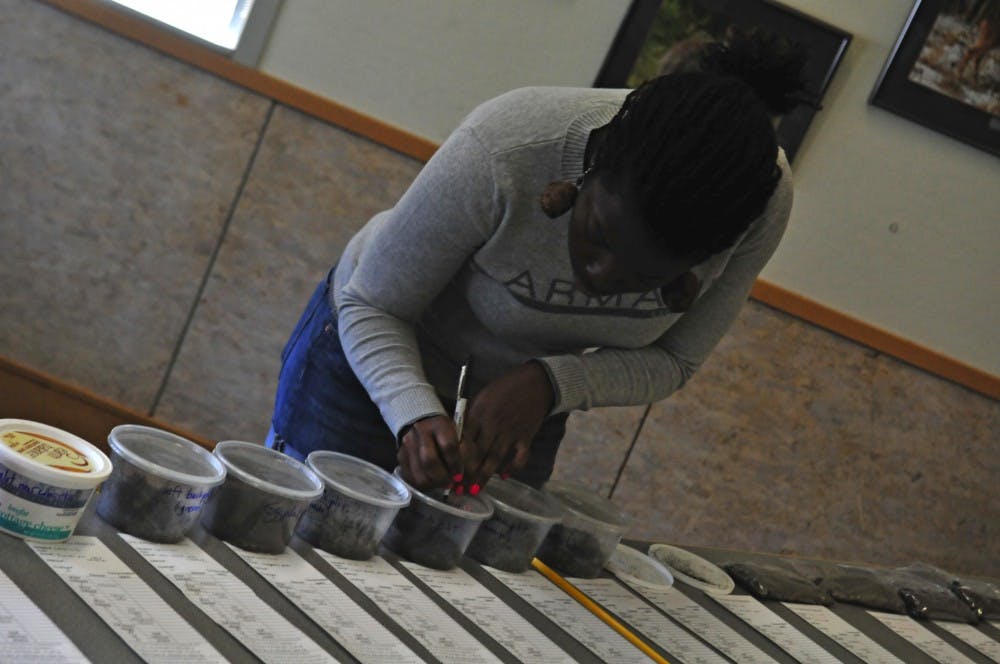
Penn students got the dirt on Philadelphia’s soil cleanliness this weekend.
Volunteers from Penn attended a three-day Soil Kitchen, in which they tested the pH levels of soil samples, the presence of lead and other heavy metal contaminants and the nutrient levels in the soil. The “kitchen” was set up in John Heinz National Wildlife Refuge in Southwest Philadelphia. Visitors came in with soil samples from locations ranging from their backyard gardens to their local schools, and waited for a few minutes for their soil to be tested.
Childhood lead poisoning, referred to by U.S. health officials as a “silent epidemic,” is widely prevalent in Philadelphia, according to assistant professor in the Department of Earth and Environmental Science Jane Willenbring, who organized the event.
“Since it is such an old city, many of these buildings have lead-based paint, which flakes off into the soil,” Willenbring said. “It’s especially bad in Philadelphia because of the presence of lead smelters.”
Philadelphia is not alone, however. The U.S. Environmental Protection Agency announced in 2009 that 21 cities in the U.S. exceeded healthy lead levels in their environment. The report included New York, Chicago, Detroit and Philadelphia.
Willenbring emphasized the need for governments to do more to prevent lead poisoning.
“They have cut the federal budget for community soil testing,” she said. “Essentially, they’re letting kids do the sampling for them.”
College senior Carissa Desalles, who helped out at the Soil Kitchen by crushing soil bags and screening them, said she was shocked to learn of Philadelphia’s high lead levels.
“I think [the Soil Kitchen is] important, especially here in Philadelphia where organic vegetables are so expensive, so people grow their own vegetables in their backyard,” Desalles said.
2009 College graduate Jarrett Stein, who also attended the event, brought in soil from a school garden.
“I work at an urban nutrition initiative, and it is a best practice to test all of our school garden soils,” Stein said. “We have young kids playing, so we don’t want them to be exposed to lead and contaminants.”
Like Stein, Lauren Fenning, a resident of Lower Merion and an attendee at previous soil kitchens, expressed concern at discovering elevated lead levels in Philadelphia.
“I only had my soil tested for nutrients, but now I wished I had it tested for heavy metal contaminants,” Fenning said. “Absolutely everything we eat is from our garden.”
Fear of exposing children to elevated levels of lead is a valid concern, Willenbring said, adding that lead poisoning among children can lead to a multitude of problems ranging from impaired brain development to lessened cognitive ability.
However, she is optimistic that awareness about lead poisoning is increasing.
“The soil kitchen was definitely a success,” Willenbring said. “Over the three days, we had around 200 people bring in soil samples.”
Willenbring added that while Penn should do more to help the West Philadelphia community live sustainably, there is also more work to be done within.
“Penn’s campus has a big challenge cleaning [the environment] up,” she said.
The Daily Pennsylvanian is an independent, student-run newspaper. Please consider making a donation to support the coverage that shapes the University. Your generosity ensures a future of strong journalism at Penn.
DonatePlease note All comments are eligible for publication in The Daily Pennsylvanian.








